重庆市渝北区Unit 3 Could you please tell me where the restrooms are? Section B (2a-2d) 说课比赛课件
文档属性
| 名称 | 重庆市渝北区Unit 3 Could you please tell me where the restrooms are? Section B (2a-2d) 说课比赛课件 |
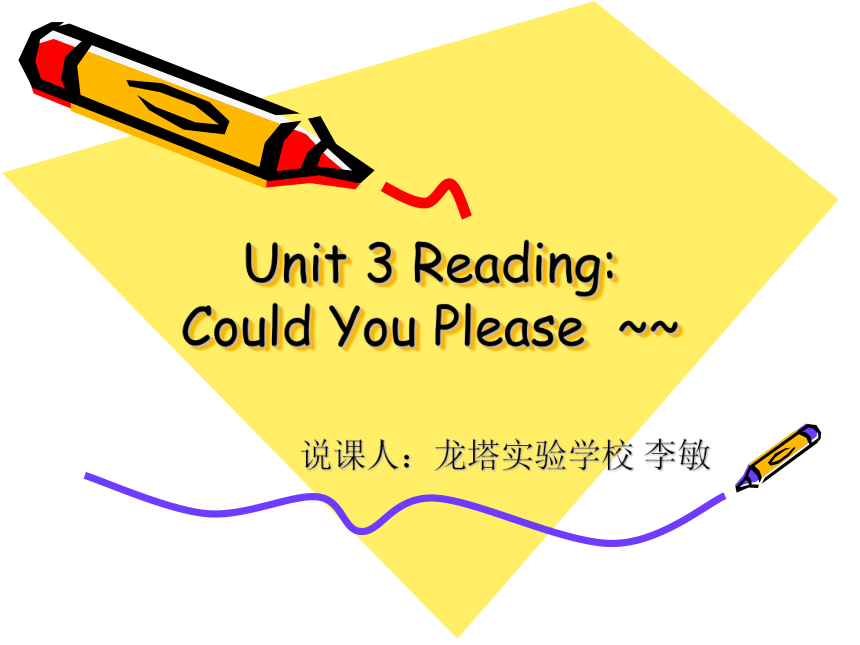
|
|
| 格式 | zip | ||
| 文件大小 | 297.3KB | ||
| 资源类型 | 教案 | ||
| 版本资源 | 人教新目标(Go for it)版 | ||
| 科目 | 英语 | ||
| 更新时间 | 2016-01-03 00:00:00 | ||
图片预览

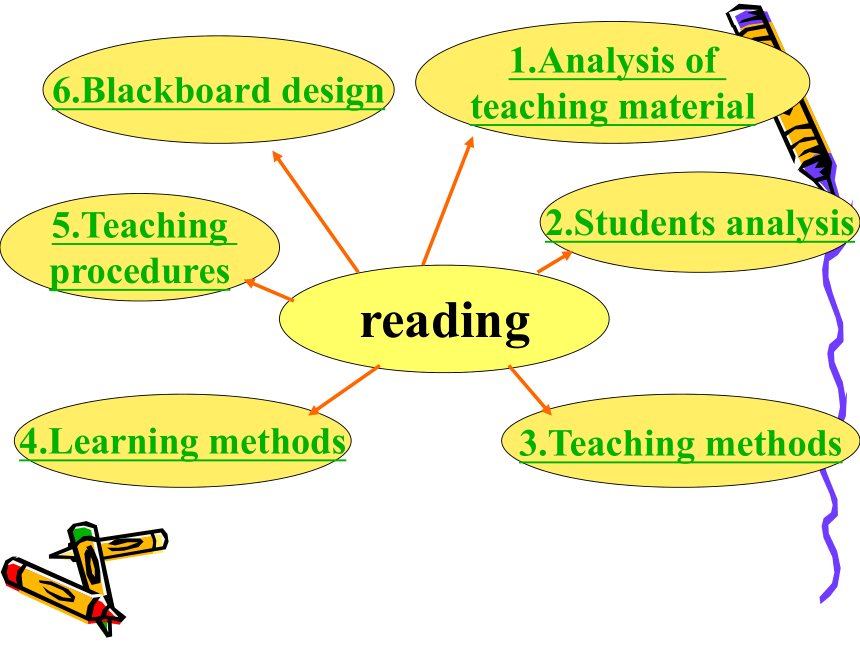
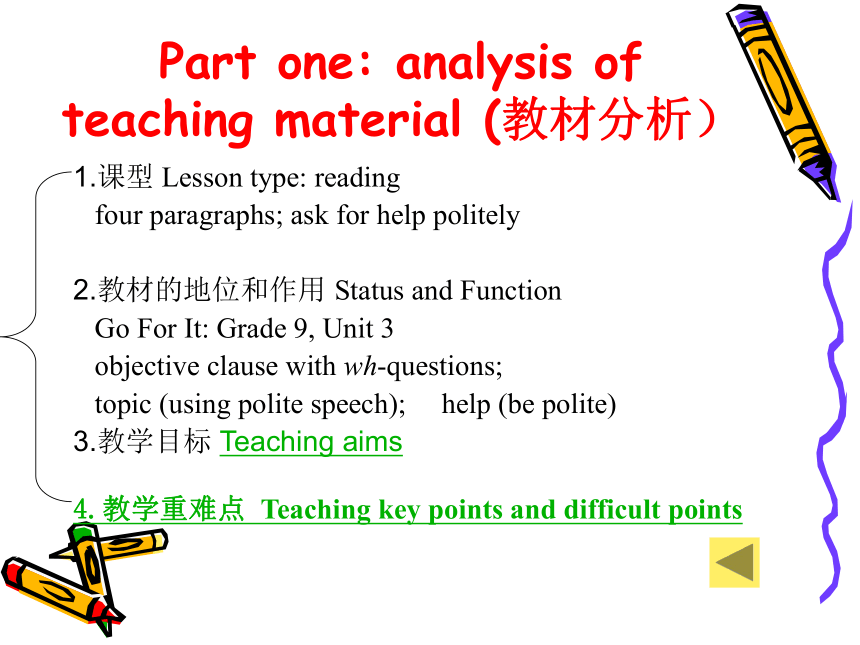
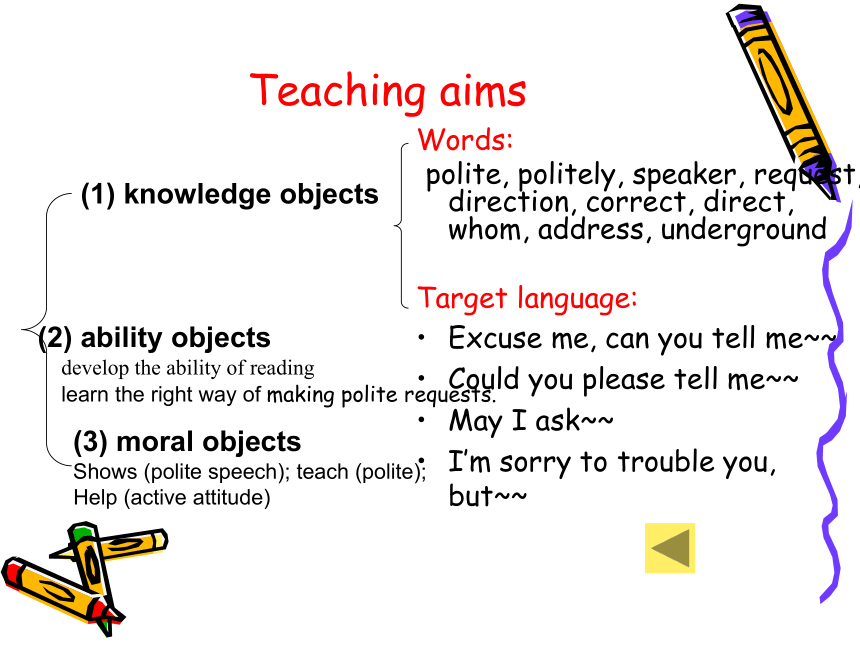
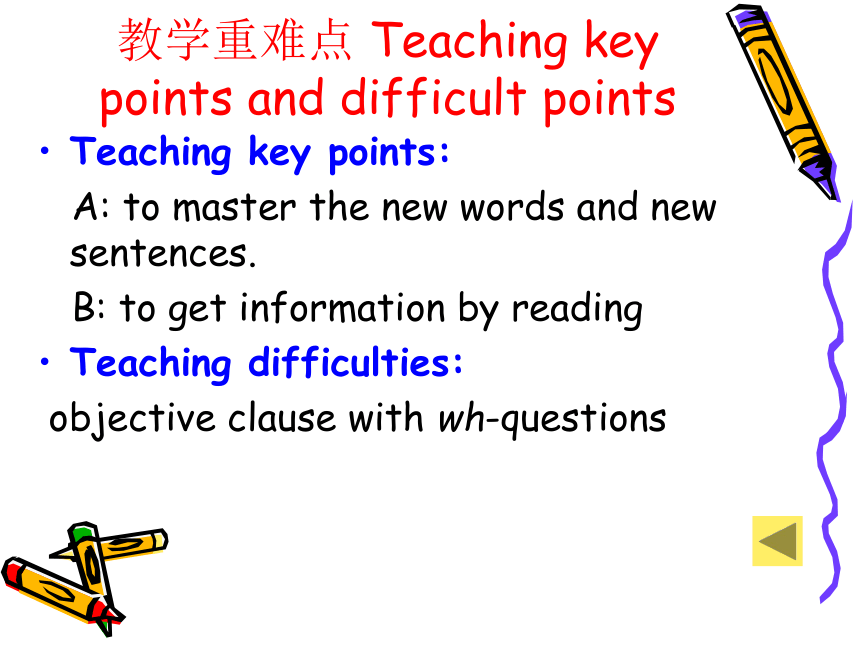
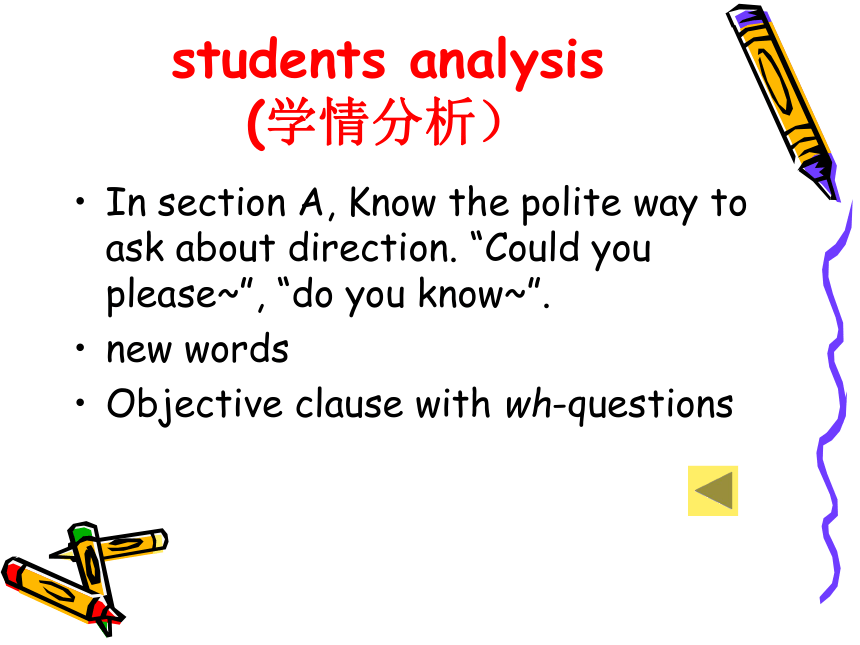
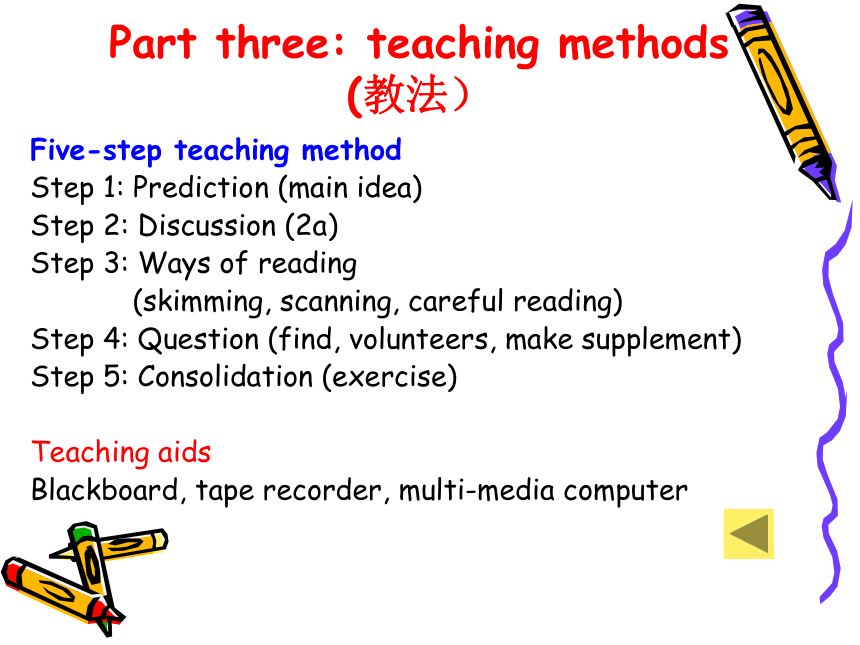
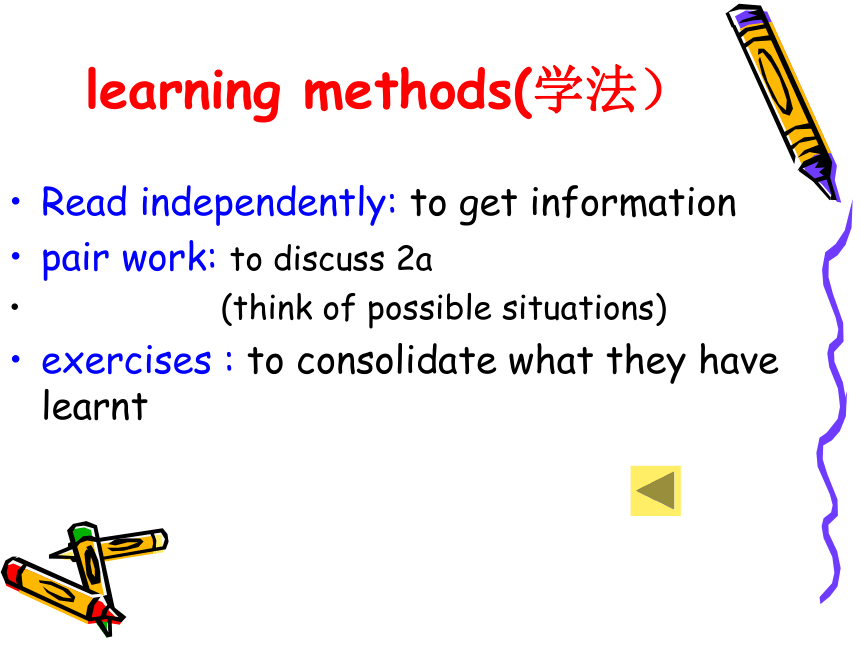
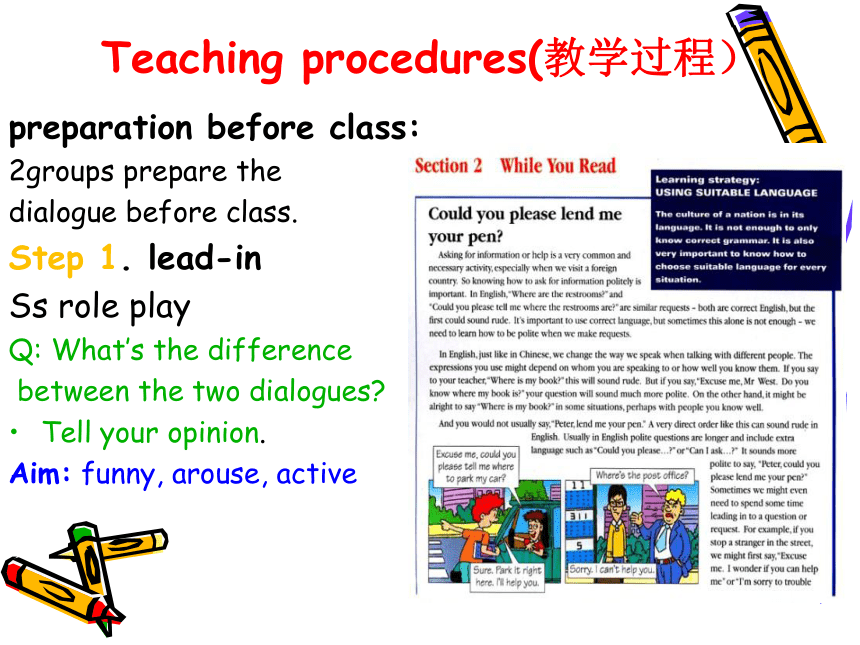
文档简介
课件22张PPT。Unit 3 Reading:
Could You Please ~~说课人:龙塔实验学校 李敏reading1.Analysis of
teaching material4.Learning methods3.Teaching methods 2.Students analysis5.Teaching
procedures6.Blackboard design Part one: analysis of teaching material (教材分析) 1.课型 Lesson type: reading
four paragraphs; ask for help politely
2.教材的地位和作用 Status and Function
Go For It: Grade 9, Unit 3
objective clause with wh-questions;
topic (using polite speech); help (be polite)
3.教学目标 Teaching aims 4.教学重难点 Teaching key points and difficult pointsTeaching aimsWords:
polite, politely, speaker, request, direction, correct, direct, whom, address, underground
Target language:
Excuse me, can you tell me~~
Could you please tell me~~
May I ask~~
I’m sorry to trouble you, but~~
(1) knowledge objects(2) ability objects
develop the ability of reading
learn the right way of making polite requests.(3) moral objects
Shows (polite speech); teach (polite);
Help (active attitude)教学重难点 Teaching key points and difficult pointsTeaching key points:
A: to master the new words and new sentences.
B: to get information by reading
Teaching difficulties:
objective clause with wh-questions
students analysis (学情分析) In section A, Know the polite way to ask about direction. “Could you please~”, “do you know~”.
new words
Objective clause with wh-questions
Part three: teaching methods (教法)Five-step teaching method
Step 1: Prediction (main idea)
Step 2: Discussion (2a)
Step 3: Ways of reading
(skimming, scanning, careful reading)
Step 4: Question (find, volunteers, make supplement)
Step 5: Consolidation (exercise)
Teaching aids
Blackboard, tape recorder, multi-media computerlearning methods(学法) Read independently: to get information
pair work: to discuss 2a
(think of possible situations)
exercises : to consolidate what they have learntTeaching procedures(教学过程) preparation before class:
2groups prepare the
dialogue before class.
Step 1. lead-in
Ss role play
Q: What’s the difference
between the two dialogues?
Tell your opinion.
Aim: funny, arouse, active
Teaching procedures Before-reading While-readingPost-readingTask1:discuss 2a
Where do you need to make polite requests? List.
Task 2: prediction (order)
a. Use more words to help you sound more polite.
b. It is important to know how to make requests politely.
c. It seems difficult to speak politely, but good speakers need to know how.
d. The choice of language depends on the situation and the relationship between the speakers.
(number: 1,2,3,4)
Step 2Step 3Step 4Reading StrategiesSkimming: to get the main idea
Scanning: to find specific information
Careful reading: for more details
Difficult sentences: ask, volunteers, supplement
阅读策略 While-reading: read fast (4 m)Paragraph 1
When you visit a foreign country, it is important to know
how to ask for help politely (adv. 礼貌地)….
Paragraph 2
Good speakers change the way they speak in different
situations. …
Paragraph 3
Usually polite questions are longer. They include expressions
such as “Could you please …?” or “May I ask …?”
Paragraph 4
However, it is important to learn how to use the right language
in different situations. … 验证orderFind all the direct questions and polite requests from the passage.2c Where are
the restrooms?1. Could you please tell me where the restrooms are?Careful reading:1.) Is it enough to speak correctly?
2.) What are the features of polite language?
3.) Is it necessary to ask indirect questions to all the people around you?
4.) In the second picture, why does the man say “Sorry, I can’t help you.? Can you change the question to a more polite one?
5. ) What do we need to think about when you talk to different people?
AhomeBstreetA/Bany public place/homeBstreet2dPost-readingconsolidation
When you visit a _______ country, it is _________ to know how to ask for help ______. For example, “Where are the restrooms?” or “Could you _____ tell me where the ________ ___?” these are similar ________ for _________ you may ask.
Both are _______ English, but the first one sounds _____ polite. That is because it is a very ______ question. It is not enough to just ask a question ________. We also need to learn how to be polite — when we ask for _____.
In English, ___ in Chinese, we change the way we ______ in different _________. The expressions you use might _______ ___ whom you are speaking to ___ how well you know them. If you say to your teacher, “When is the school trip?” this might sound ________. But if you say, “Excuse me, Mr. West, do you know when the school trip ___?”, this will sound _____ more polite. However, it is all right to ask direct questions to your classmates because you know them ____. It might seem more _______ to speak politely than _______. It is important to learn how to use _____ ________ in different situations. This will also help you ___________ better with other people.
y Homework
Finish 3a.
Write a polite letter to the school asking for the information you want to know. Use your notes in 3a.
Writing tips.In the letter, you should:
introduce yourself
say when you are coming
politely ask for information
thank the person for helping you
useful expressions:
My name is … and I’m from …
I’ll be coming to your school for …
I’d like to know about …
I would like to thank you for…
I’m looking forward to your replyBlackboard Design Unit 3 Section B
Could You Please~~?
Words:
polite, politely, speaker,
request, direction,
correct, direct, whom,
address, undergroundSentences:
Excuse me, can you tell me~~
could you please tell me~~
May I ask~~
I’m sorry to trouble you, but~~
Prediction before class1. prediction: 生词;语言障碍;降低难度
2c: direct polite questions
polite request—indirect questions
(宾语从句:语序)
3. Fill in blanks: 一空多词,讨论
teaching material4.Learning methods3.Teaching methods 2.Students analysis5.Teaching
procedures6.Blackboard design Part one: analysis of teaching material (教材分析) 1.课型 Lesson type: reading
four paragraphs; ask for help politely
2.教材的地位和作用 Status and Function
Go For It: Grade 9, Unit 3
objective clause with wh-questions;
topic (using polite speech); help (be polite)
3.教学目标 Teaching aims 4.教学重难点 Teaching key points and difficult pointsTeaching aimsWords:
polite, politely, speaker, request, direction, correct, direct, whom, address, underground
Target language:
Excuse me, can you tell me~~
Could you please tell me~~
May I ask~~
I’m sorry to trouble you, but~~
(1) knowledge objects(2) ability objects
develop the ability of reading
learn the right way of making polite requests.(3) moral objects
Shows (polite speech); teach (polite);
Help (active attitude)教学重难点 Teaching key points and difficult pointsTeaching key points:
A: to master the new words and new sentences.
B: to get information by reading
Teaching difficulties:
objective clause with wh-questions
students analysis (学情分析) In section A, Know the polite way to ask about direction. “Could you please~”, “do you know~”.
new words
Objective clause with wh-questions
Part three: teaching methods (教法)Five-step teaching method
Step 1: Prediction (main idea)
Step 2: Discussion (2a)
Step 3: Ways of reading
(skimming, scanning, careful reading)
Step 4: Question (find, volunteers, make supplement)
Step 5: Consolidation (exercise)
Teaching aids
Blackboard, tape recorder, multi-media computerlearning methods(学法) Read independently: to get information
pair work: to discuss 2a
(think of possible situations)
exercises : to consolidate what they have learntTeaching procedures(教学过程) preparation before class:
2groups prepare the
dialogue before class.
Step 1. lead-in
Ss role play
Q: What’s the difference
between the two dialogues?
Tell your opinion.
Aim: funny, arouse, active
Teaching procedures Before-reading While-readingPost-readingTask1:discuss 2a
Where do you need to make polite requests? List.
Task 2: prediction (order)
a. Use more words to help you sound more polite.
b. It is important to know how to make requests politely.
c. It seems difficult to speak politely, but good speakers need to know how.
d. The choice of language depends on the situation and the relationship between the speakers.
(number: 1,2,3,4)
Step 2Step 3Step 4Reading StrategiesSkimming: to get the main idea
Scanning: to find specific information
Careful reading: for more details
Difficult sentences: ask, volunteers, supplement
阅读策略 While-reading: read fast (4 m)Paragraph 1
When you visit a foreign country, it is important to know
how to ask for help politely (adv. 礼貌地)….
Paragraph 2
Good speakers change the way they speak in different
situations. …
Paragraph 3
Usually polite questions are longer. They include expressions
such as “Could you please …?” or “May I ask …?”
Paragraph 4
However, it is important to learn how to use the right language
in different situations. … 验证orderFind all the direct questions and polite requests from the passage.2c Where are
the restrooms?1. Could you please tell me where the restrooms are?Careful reading:1.) Is it enough to speak correctly?
2.) What are the features of polite language?
3.) Is it necessary to ask indirect questions to all the people around you?
4.) In the second picture, why does the man say “Sorry, I can’t help you.? Can you change the question to a more polite one?
5. ) What do we need to think about when you talk to different people?
AhomeBstreetA/Bany public place/homeBstreet2dPost-readingconsolidation
When you visit a _______ country, it is _________ to know how to ask for help ______. For example, “Where are the restrooms?” or “Could you _____ tell me where the ________ ___?” these are similar ________ for _________ you may ask.
Both are _______ English, but the first one sounds _____ polite. That is because it is a very ______ question. It is not enough to just ask a question ________. We also need to learn how to be polite — when we ask for _____.
In English, ___ in Chinese, we change the way we ______ in different _________. The expressions you use might _______ ___ whom you are speaking to ___ how well you know them. If you say to your teacher, “When is the school trip?” this might sound ________. But if you say, “Excuse me, Mr. West, do you know when the school trip ___?”, this will sound _____ more polite. However, it is all right to ask direct questions to your classmates because you know them ____. It might seem more _______ to speak politely than _______. It is important to learn how to use _____ ________ in different situations. This will also help you ___________ better with other people.
y Homework
Finish 3a.
Write a polite letter to the school asking for the information you want to know. Use your notes in 3a.
Writing tips.In the letter, you should:
introduce yourself
say when you are coming
politely ask for information
thank the person for helping you
useful expressions:
My name is … and I’m from …
I’ll be coming to your school for …
I’d like to know about …
I would like to thank you for…
I’m looking forward to your replyBlackboard Design Unit 3 Section B
Could You Please~~?
Words:
polite, politely, speaker,
request, direction,
correct, direct, whom,
address, undergroundSentences:
Excuse me, can you tell me~~
could you please tell me~~
May I ask~~
I’m sorry to trouble you, but~~
Prediction before class1. prediction: 生词;语言障碍;降低难度
2c: direct polite questions
polite request—indirect questions
(宾语从句:语序)
3. Fill in blanks: 一空多词,讨论
同课章节目录
- Unit 1 How can we become good learners.
- Section A
- Section B
- Unit 2 I think that mooncakes are delicious!
- Section A
- Section B
- Unit 3 Could you please tell me where the restroom
- Section A
- Section B
- Unit 4 I used to be afraid of the dark.
- Section A
- Section B
- Unit 5 What are the shirts made of?
- Section A
- Section B
- Review of Units 1-5
- Unit 6 When was it invented?
- Section A
- Section B
- Unit 7 Teenagers should be allowed to choose their
- Section A
- Section B
- Unit 8 It must belong to Carla.
- Section A
- Section B
- Unit 9 I like music that I can dance to.
- Section A
- Section B
- Unit 10 You're supposed to shake hands.
- Section A
- Section B
- Review of Units 6-10
- Unit 11 Sad movies make me cry.
- Section A
- Section B
- Unit 12 Life is full of the unexpected
- Section A
- Section B
- Unit 13 We're trying to save the earth!
- Section A
- Section B
- Unit 14 I remember meeting all of you in Grade 7.
- Section A
- Section B
- Review of Units 11-14
